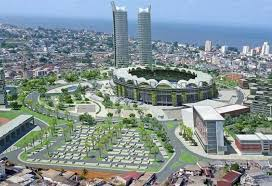Libreville: A Coastal Capital Blending History and Nature
Nestled along the Atlantic coast of Central Africa, Libreville, the capital and largest city of Gabon, offers a unique blend of historical significance, cultural vibrancy, and access to stunning natural landscapes.
A City Forged by History
Libreville's history is deeply intertwined with the colonial era and the transatlantic slave trade. Originally a port for the timber industry, the city grew under French colonial rule and became the capital upon Gabon's independence in 1960.
- The Founding of Libreville: In 1849, the French Governor Louis-Edouard Bouët-Willaumez settled freed slaves at a site on the Gabon Estuary, naming it Libreville, symbolizing a new beginning.
- French Colonial Influence: From the late 19th to the mid-20th century, Libreville was a key administrative center within French Equatorial Africa, leaving a lasting impact on its architecture, language (French is the official language), and culture.
- Independence and Growth: Since gaining independence, Libreville has evolved into a bustling urban center, the heart of Gabon's political, economic, and cultural life.
Discovering the Culture and Cityscape
Libreville offers a captivating mix of modern and traditional influences, evident in its architecture, cuisine, and social interactions.
- National Museum of Arts and Traditions: Immerse yourself in Gabon's rich cultural heritage at this museum.
Explore a diverse collection of traditional masks, sculptures, musical instruments, and artifacts that showcase the country's various ethnic groups, including the Fang, Mpongwe, and others. - Presidential Palace (Palais Présidentiel): While visitors cannot enter, the grandeur of the Presidential Palace is worth admiring from the outside. Its impressive architecture and well-maintained gardens offer a glimpse into Gabonese craftsmanship.
- St. Michael's Church of Nkembo: This unique church, built in 1964 with local materials, features pillars and friezes sculpted by a Gabonese artist, depicting scenes from the Old and New Testaments.
- Mont-Bouët Market: Experience the vibrant energy of local life at the bustling Mont-Bouët Market. Here, you can find everything from fresh produce and local delicacies to handmade crafts and traditional clothing. It's a fantastic place to interact with locals and find unique souvenirs.
- Modern City Center: Explore the modern districts of Libreville, featuring hotels, businesses, and markets, reflecting the city's role as Gabon's economic hub.
Natural Escapes and Coastal Beauty
Libreville's coastal location provides easy access to beautiful beaches and natural wonders.
- Pointe-Denis Beach: Take a short ferry ride across the Gabon Estuary to Pointe-Denis, a peninsula renowned for its pristine, less crowded beaches.
Enjoy sunbathing, swimming, and fresh seafood from local vendors in a tranquil setting. - Pongara National Park: Extending beyond Pointe-Denis, this national park offers a diverse landscape of rolling savannah, pristine coastline, and tropical forests.
It's a prime location for wildlife viewing, including potential sightings of elephants and various bird species. - Arboretum de Sibang: Located a short distance from the city, this arboretum is a living library of Central African flora. Take a guided tour to learn about the diverse native plant species and the conservation efforts in Gabon.
- Akanda National Park: Just a short drive from Libreville, this park protects important mangrove ecosystems and diverse wildlife. Explore its unique landscapes and potentially spot various bird species.
Experiencing Gabonese Culture
Engage with the warm hospitality and rich traditions of the Gabonese people.
- Cuisine: Sample local Gabonese dishes, often featuring fresh seafood, grilled meats (Nyama Choma), and flavorful soups like Mbanga. Explore local restaurants and markets for an authentic culinary experience.
- Festivals and Celebrations: If your visit aligns with national holidays like Gabon National Day (August 16th), partake in the vibrant celebrations with parades, traditional dances, and music.
- Bwiti Culture: While requiring respectful engagement and often guided experiences, learning about the spiritual traditions like Bwiti, which involves ancestor veneration and unique ceremonies, can offer a deeper understanding of Gabonese culture.
Navigating Libreville
Taxis are readily available for getting around Libreville. Be sure to negotiate the fare beforehand. While French is the official language, having some basic French phrases will enhance your interactions with locals.
Planning Your Visit
- Visa Requirements: Ensure you have the necessary visa and travel documents before your trip.
- Health Precautions: Consult your doctor about recommended vaccinations and health precautions for travel to Gabon, including yellow fever.
- Safety: Exercise caution and be aware of your surroundings, particularly at night and in crowded areas. It's advisable to avoid poorly lit streets and beaches after dusk.
Libreville offers a unique and rewarding travel experience for those seeking to explore beyond the well-trodden paths. Its blend of historical significance, cultural richness, and natural beauty provides a captivating glimpse into the heart of Gabon.




